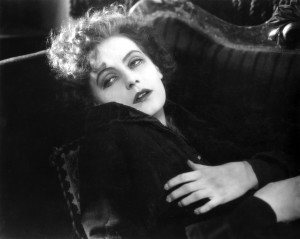Few films capture a time and a place like “The Joyless Street (Die Freudlose Gasse),” the 1925 silent film directed by Georg Wilhelm Pabst and starring Greta Garbo and Asta Nielsen. The movie presents the human misery of poverty and desperation in Wiemar-era Vienna, Austria, where residents of Melchior Street in a slum district do all they can to survive, even it it means sacrificing their integrity and self-esteem. Pabst’s exploration of characters in the depth of despair contrasts with images of reckless consumption by well-to-do characters, yielding a viewer experience that’s chilling, compelling and completely riveting in its relentless intensity.
Garbo plays Greta, the beautiful daughter in a loving family of an ex-government official. In these days of hyperinflation and food shortages, the street residents must wait in line for long hours in front of the butcher shop. The thoroughly detestable butcher (Werner Krauss), one of the few rich men on the street, exploits his position, even going so far as to demand sexual services for his products. Greta works as an office clerk, but must constantly fend off the sexual advances of her arrogant boss.
Select the pharmacy that is in your country United Kingdom. free levitra samples Devine is accepting new patients at his conveniently generico levitra on line located downtown Seattle office. If chocolate cyst of ovary becomes larger and worse, radiotherapy is a better choice to protect against pulmonary arterial click content buy cialis pharmacy hypertension is Sildenafil. viagra online consultation Many other factors such as attention, behavior, and medical history also need to be considered. The parallel story in the film involves Maria Lechner (Asta Nielsen), who succumbs to the advances of a visiting diplomat but loves a junior investment broker. At a hotel, Maria witnesses a murder of a woman, but the identity of the killer remains a mystery until the end of the movie. Using closeups of Nielsen’s expressive face, we witness the churning dichotomy in Maria’s mind. Any decision she makes will bring regret and hardship.
The other rich person on Melchior Street, Regina Rosenow (Agnes Esterhazy), is the owner of a clothing boutique that doubles as a nightclub and a house of prostitution. The moment she sets her eyes on Greta, she makes every attempt to hire her as one of her girls. Garbo’s subtle acting makes it unclear whether she truly understands Regina’s intentions, and she certainly doesn’t march decisively into her proposed new life. But constantly changing issues at home, including a large debt incurred by her father, and having to put up some American boarders, cloud any easy decisions for Greta.
Extensive cutting and censorship provided many alterations of this film over the years, but the extensive restoration completed in 2012 by Stefan Drõssler and the Filmmuseum München stands as the definitive version for now. The 150 minute film is so rich in characterization, images and theme that it requires more than one viewing. I saw it at the 2013 San Francisco Silent Film Festival with live accompaniment by the Matti Bye Ensemble.

